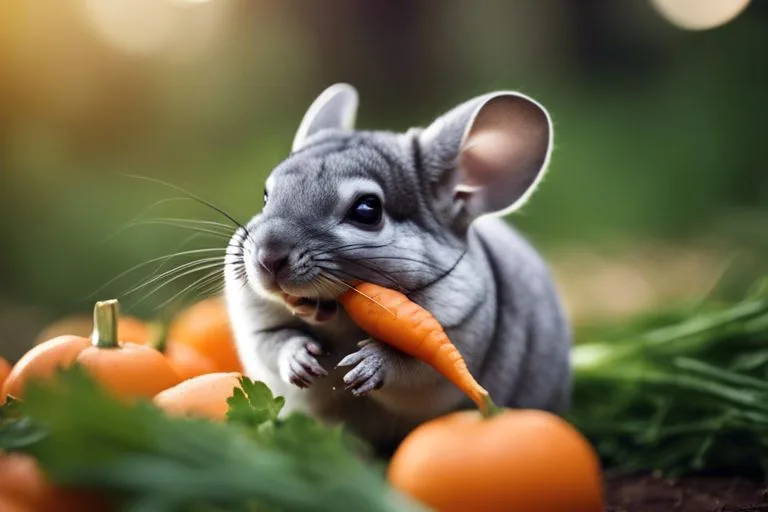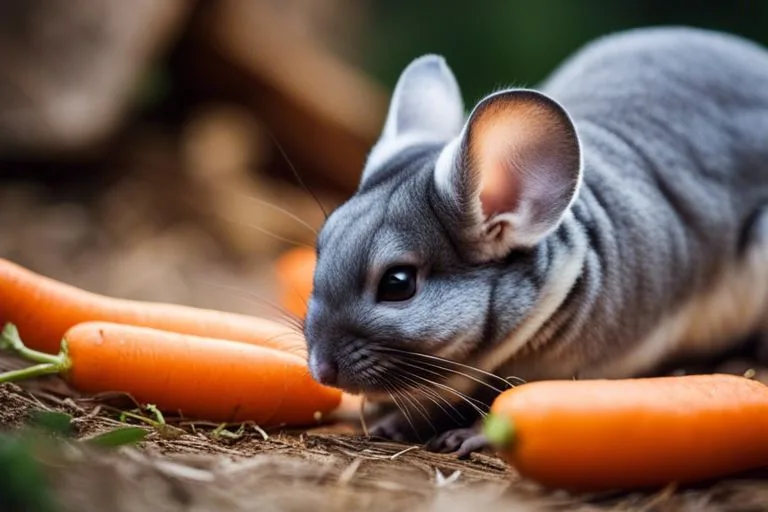Chinchillas can eat carrots in small amounts as an occasional treat. However, their high sugar content makes them unsuitable for regular consumption. To ensure your chinchilla’s health, carrots should only complement their primary diet of hay, pellets, and fresh water. Below, we explore how to safely feed carrots to chinchillas and provide alternative treat options.
Key Takeaways
- Carrots are a rare treat: Offer only a small piece, no larger than the size of a thumbnail, and not more than once per week.
- High sugar content: Excess carrots can cause digestive issues and weight gain. Moderation is essential.
- Stick to the basics: A healthy chinchilla diet should primarily consist of hay, pellets, and water.

Chinchillas’ Dietary Needs
Overview of Chinchilla Nutrition
Chinchillas are herbivores with sensitive digestive systems that require a high-fiber, low-fat, and low-sugar diet. Their primary diet includes:
- Hay: Essential for digestion and dental health.
- Pellets: Provide balanced nutrients.
- Fresh water: Necessary for hydration.
Importance of Hay and Fiber
Timothy hay is the best option for chinchillas due to its high fiber and low calcium content. It helps:
- Maintain digestion: Prevents issues like bloating or gastrointestinal stasis.
- Support dental health: Wears down continuously growing teeth.
Provide unlimited access to hay to ensure your chinchilla’s health.
Carrots as a Treat
Nutritional Value of Carrots
Carrots are rich in:
- Vitamin A: Supports vision and immune health.
- Beta-carotene: An antioxidant that converts to vitamin A.
- Fiber: Assists digestion when fed in moderation.
However, carrots are also high in natural sugars, which can upset a chinchilla’s delicate digestive system if overfed.
Can Chinchillas Digest Carrots?
Chinchillas can digest carrots in small quantities, but their digestive systems are sensitive to excess sugar. Feeding large amounts may cause:
- Diarrhea
- Bloating
- Stomach discomfort
Limit carrot portions to a thumbnail-sized piece no more than once per week.
The Pros and Cons of Feeding Carrots
| Pros | Cons |
|---|---|
| High in Vitamin A and beta-carotene | High sugar content, leading to potential weight gain |
| Provides fiber for digestion | Risk of digestive issues like diarrhea |
| Crunchy texture supports dental health | Overfeeding can lead to bloating and discomfort |
Preparing Carrots for Your Chinchilla
Choosing the Right Carrots
- Fresh, organic carrots are ideal. Avoid those with mold or soft spots.
- Baby carrots are a convenient, pesticide-free option.
Washing and Chopping Safely
- Rinse carrots thoroughly under running water to remove dirt and chemicals.
- Peel the outer skin to reduce pesticide residue.
- Cut the carrot into small, bite-sized pieces to prevent choking.
Always supervise your chinchilla while they eat carrots to ensure they chew properly.
Alternatives to Carrots
Fresh Fruits and Vegetables
Other occasional treats include:
- Apple slices (seedless)
- Blueberries
- Dandelion greens
- Kale
Limit these treats to tiny portions once or twice a week to avoid digestive upset.
Commercial Chinchilla Treats
- Opt for treats formulated specifically for chinchillas.
- Look for high-fiber, low-sugar options.
- Avoid those containing nuts, seeds, or dried fruits, as these are hard to digest.
Maintaining a Balanced Diet
To ensure your chinchilla stays healthy:
- Keep hay, pellets, and water as the dietary foundation.
- Offer treats like carrots or fruits sparingly, no more than once a week.
- Monitor your chinchilla’s behavior and stool after introducing new foods to identify potential digestive issues.
Final Words
Chinchillas can enjoy carrots as a rare treat, but moderation is key to avoid health issues. Always prioritize a high-fiber diet of hay and pellets, and monitor your chinchilla’s reaction to new foods. For specific dietary advice, consult a veterinarian to ensure your furry friend stays healthy and happy.
By understanding your chinchilla’s dietary needs, you can provide safe and nutritious options that contribute to their overall well-being.
FAQ
Q: How often can chinchillas eat carrots?
A: Carrots should be fed sparingly—no more than a thumbnail-sized piece once per week.
Q: Are carrots safe for chinchillas?
A: Yes, carrots are safe in small amounts, but overfeeding can cause digestive upset due to their sugar content.
Q: What are better alternatives to carrots?
A: Other safe treats include apple slices, blueberries, and dandelion greens, provided they’re fed in moderation.
Q: How can I ensure my chinchilla’s diet is healthy?
A: Focus on providing unlimited hay, high-quality pellets, and fresh water. Treats should be an occasional supplement.
